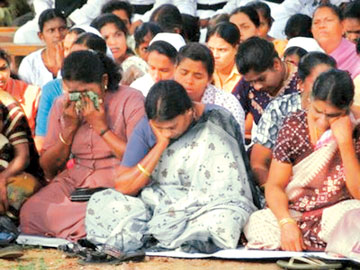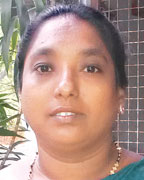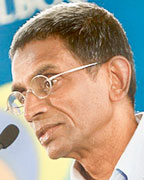Rescued!
A lone woman's struggle to give meaning and purpose
to war widows in Jaffna:
By P.K. Balachandran
'Tharaka' , which means the star as well as 'savior' in Sanskrit is
the true 'star' in the lives of many widows. Thirty-seven-year-old Saila,
a war widow of Chavatkaddu in the Jaffna District, stands out from most
victims of the 30-year war in the North Sri Lanka.
 She chose not to wail, complain, bemoan or find fault with others for
her fate. She has pulled herself out of the lot that life's tragedies
had thrust her into and helped more than a hundred other widows come out
of the abyss of hopelessness. She chose not to wail, complain, bemoan or find fault with others for
her fate. She has pulled herself out of the lot that life's tragedies
had thrust her into and helped more than a hundred other widows come out
of the abyss of hopelessness.
Saila's organization, has mainstreamed widows, traditionally shunned
and relegated to the background in Tamil society, which sees them as
being a bad omen and so should be kept out of sight.
War widows
Among the deep and seemingly indelible scars of war is the existence
of an estimated 40,000 widows in the Northern Province. Among the
victims of war's mindless violence, those widowed were the most
affected.
They were forced to become breadwinners overnight, even as they
carried the stigma of being a social ill omen. Economic deprivation and
social rejection combined to push these women into deep depression.
 |
| Saila - a war
widow of Chavatkaddu in the Jaffna district |
 |
Dr Daya
Somasundaram,
well-known psychiatrist and
Jaffna University Professor |
"The most worrying part, however, was that the widows' families were
going to seed," Saila pointed out.
Ironically, the confidence that Saila exudes today, was created in
the crucible of a series of tragedies which had afflicted her life.
She was only 17 when her fisherman father was killed in an artillery
shell attack and only 26 when her husband was killed by the Navy at
mid-sea.
A year later, her brother was permanently disabled in another shell
attack. " My mother and I were both widowed in quick succession, but
while she went into depression, I was determined to fight it," Saila
told visiting journalists at her organization, the Tharaka Widows'
Activity Centre, in Chavatkaddu, a fishing village.
She went to the well-known psychiatrist and Jaffna University,
Professor, Dr.Daya Somasundaran, for help. He is one of the moving
spirits of Shantiham, a Jaffna-based NGO specializing in trauma
management.
Somasundaram believes that traumatized and socially marginalized
persons can be mainstreamed through participation in social activism,
group activity and assumption of leadership roles.
Trauma management
"Even the most withdrawn become active and acquire a new persona,
when they are put in groups involved in some meaningful activity. If
leadership roles are assigned to them, they show hidden capabilities.
Their lives acquire a new meaning and they tend to put behind them
the traumatic experiences of the past," Somasundaram said.
It was at Somasundaram's suggestion that Saila floated Tharaka,
which, to date, has rescued 105 women from depression and despondency.
However, initially, it was difficult to get widows to join Tharaka.
"Families said that the duty of the widow is to stay home and look
after the rest of the family and not go gallivanting," a pained Saila
recalled.
The second problem was to get a premises, where the widows could
meet.
"Most landlords were reluctant to rent out their premises to us. One
of them asked for an advance of Rs.150,000, but we did not have that
kind of money. We then approached the late T. Maheswaran, who was then
the Minister of Hindu Religious Affairs. After making us run from pillar
to post for three months, he gave Rs.100,000. But we were still short of
Rs.50,000. Luckily, a Scottish missionary offered to give that amount.
" But still, the monthly rent had to be paid. At this point,
Dr.Somasundaram came up with the idea that Tharaka work for Shanthiham
and the fee for it could go towards payment of the monthly rent," Saila
said.
Social resistance
She realized that for Tharaka to be meaningful to the widows, their
existential problems will have to be addressed first and foremost. Since
economic hardship was the main issue, Saila got the widows to do a small
business together.
"The women pickle fish and market them. A chit fund gives loans up to
Rs. 3000 to members to meet their personal and business expenditure,"
she said. But ambitious Saila has widened the canvas for "Tharaka". Its
members get involved in solving Chavatkaddu's civic problems.
"We started taking the initiative in these matters and we intercede
with the government on behalf of the village. Recently, we solved a
severe water problem. Seeing our successes, villagers are now using us
as their spokespersons! " she said proudly.
The once marginalized widows, dismissed by society as good for
nothing creatures, and an evil omen, are now sought after by fellow
villagers to assume the leadership role.
Tharaka puts its premises to social use when it is not conducting any
activities there. "We allow school girls to come and study here during
the day and allow boys to study in the evenings. This is done to provide
the right kind of atmosphere for studies which may not exist in their
homes," Saila said. Saila stresses the importance of hearing out the
widows or anyone who is traumatized. "They have to be heard when they
describe their plight and recall the tragedies they had gone through.
Asking them to shut these out and think anew is not correct. By talking,
they unburden themselves and for this, they need a patient and
sympathetic listener. I listen," she said.
Saila goes to the Wanni every 15 days to meet displaced and
traumatized women. Tharaka's activities do not yet extend to the Wanni,
which saw the bitterest fighting in Eelam War IV. But Saila does the
next best thing - go there and hear out the people.In addition, the
widows of Tharaka help out with the work being done by Shanthiham.
Re-marriage
Asked about widow remarriage as a solution to the problem of
widowhood, Saila said that she is neither for nor against widow
remarriage.
"It depends on the wish of the widow. I know of re-marriages which
have succeeded, and also those which have not. But very few amongst us
here have re-married," she said.
Saila' work is now internationally recognized. The embassy of Finland
in India which is also accredited to Sri Lanka, has provided some funds.
In 2005, UNESCO had nominated her among 12 Sri Lankan women for the
Nobel Peace Prize.
|

